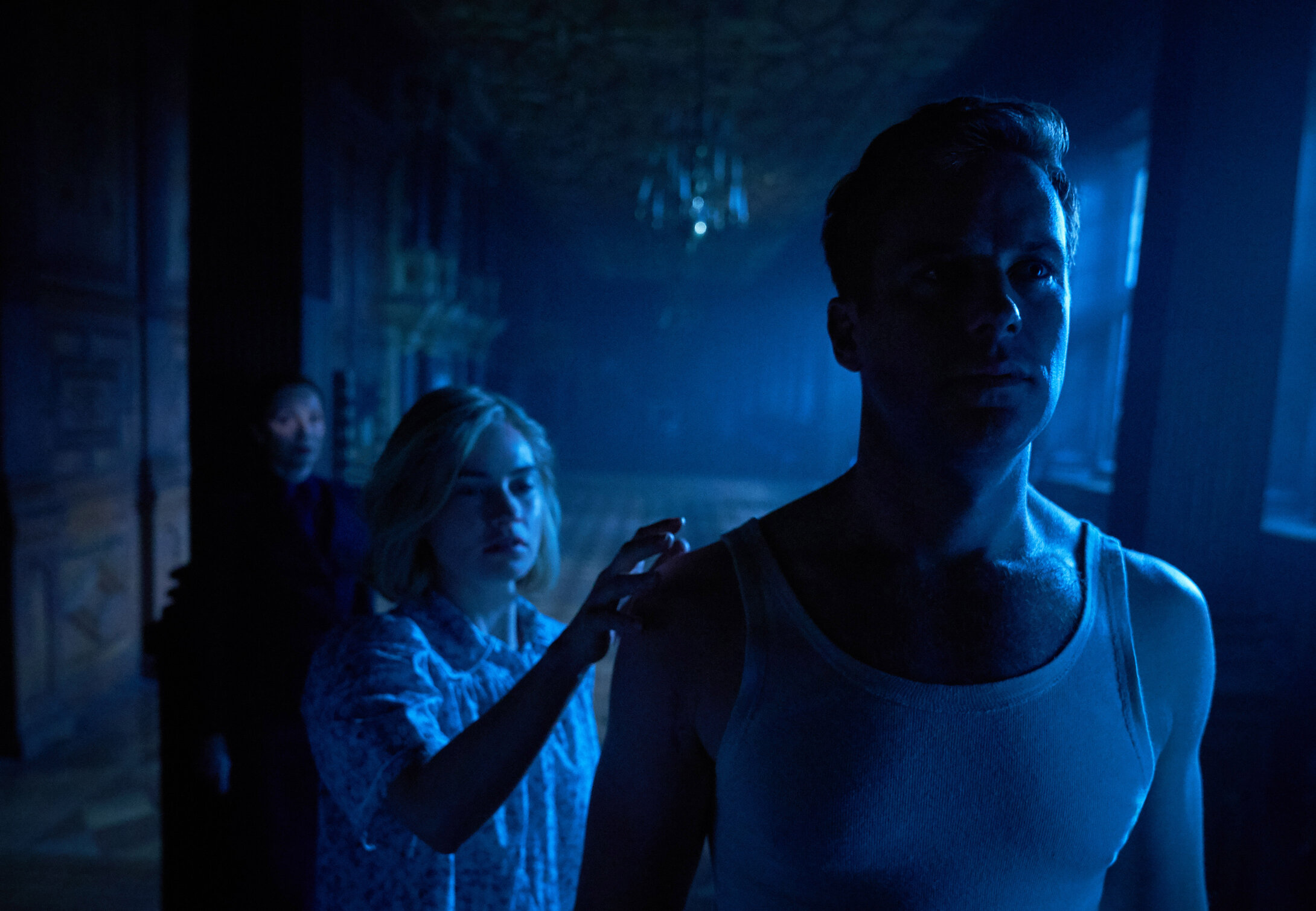
“To love is to let go.” “You can’t steal second base and keep your foot on first.” These phrases allude to the fact that part of making progress is freeing oneself from the burdens of the past. Life will offer many constraints, some of our own doing and some foisted upon us, from which we must break free in order to realize our true potential. Director Ben Wheatley has revisited a literary and film classic that explores such barriers and the issues they create.
Based on the 1938 novel by Daphne du Maurier, Rebecca takes alongside a whirlwind romance in Monte Carlo where wealthy and handsome widower Maxim de Winter (Armie Hammer) meets and falls in love with young ward (Lily James) under the stewardship of the cruel Mrs. Van Hopper (Ann Dowd). After falling in love, the new Mr. and Mrs. de Winter arrive at his palatial estate Manderley on the English coast. As Mrs. de Winter tries to settle into her new life amidst her naivety and inexperience she also finds herself up against the memory of Maxim’s first wife, the elegant and urbane Rebecca who died tragically and has her legacy kept alive by Manderley’s head housekeeper Mrs. Danvers (Kristin Scott Thomas). As Mrs. de Winter tries to win over her husband’s social circle, we uncover the entanglements of his past.
Rebecca’s now classic story and Wheatley’s cinematic vision here speak to the dangers of devotion and the barriers that both the past and society’s artificial class constraints represent in our lives. Both Mrs. De Winter and Maxim feel the constraints that class and the attached expectations for their respective stations in life thrust upon them but in different ways. Mrs. De Winter’s lower class status results in constant judgement and mistreatment from most people she encounters leading to her insecurities and unhappiness. For Maxim, we come to find out this idyllic previous marriage was not all that it appeared to be on the surface, but he soldiered on due to the expectations he has as a well-to-do married man. These constraints foisted upon us by society create barriers for our present and future which we see play out through the onscreen couple. Maxim has the added misfortune of continuing to carry the trauma from his past with him into his present, preventing him from fully connecting with the new Mrs. De Winter despite a part of him wanting to do so.
In the case of the film’s antagonist Mrs. Danvers, her years-long devotion to her employer Rebecca De Winter has devolved into an obsession that has made her danger to herself and others. Loyalty to those we love and/or believe in can be a good thing, but also something that easily crosses the fine line into cult-like piety as we see in Mrs. Danvers. Her fixation on her deceased employer turns Manderlay itself into a sort of mausoleum that has entombed both Mmes. De Winter; that is the ghost of Rebecca and, figuratively speaking, the current Mrs. De Winter, as she is stifled and constrained by the memory of a ghost which she can never overcome. Whether it be a person, a career, or an idea, many of us can become attached to something or someone to the point where it clouds our ability to reason or causes us to lash out at others in defense of our fixation.
It would be nigh impossible to discuss this film without bringing up its legendary 1940 predecessor and Best Picture winner directed by the equally legendary Alfred Hitchcock. While the Rebecca of 2020 stands on its own narratively to make any such comparison unnecessary, the task of its ensemble to live up to their contemporaries of the past was daunting but one they were able to accomplish. Armie Hammer had the tall order of following up the performance of perhaps the greatest actor to ever live in Laurence Olivier. Not only was Hammer able to perform admirably, he offers in Rebecca one of his best performances to date. The American’s English accent work was more than serviceable (though British readers may disagree I am sure) and his portrayal of the aristocratic Maxim De Wynter and the slow reveal of his inability to be the husband Lily needed is superb. Kristin Scott Thomas had perhaps the even more impossible task of reprising the role of one of the greatest villains ever in Mrs. Danvers and Judith Anderson’s virtuoso performance. Thomas shines here in a depiction of Mrs. Danvers that is a bit more sympathetic and layered than the obsessive villain in the 1940 classic.
The film is packed with lush, scenic cinematography that makes the English countryside that provides its setting feel as regal and posh as it’s meant to be. In combination with fantastic production design, Rebecca is eye-poppingly colorful and transports us directly into its period setting. Wheatley even imparts the film with a bit of clever symbolism and visual storytelling, as we watch Mrs. De Winter and Mrs. Danvers, seemingly having made nice, playing with marionettes just as Mrs. Danvers is working to pull Mrs. De Winter’s strings in order to lead her to the disastrous night at the ball. Rebecca is the story that you’re familiar with, but not a carbon copy of the Hitchcock classic, which allows it to be judged on its own merits; free from the constraints of the past. It doesn’t reinvent the wheel, but the performances from its cast and striking cinematography make it a decent watch for an updated take on the story that won’t replace the original or even try to do so. As the story itself shows us, being free of such limitations is what’s truly needed to reach our lives’ true potential.
Image: Netflix

